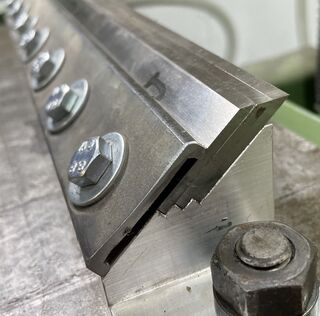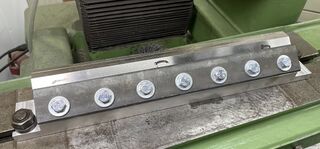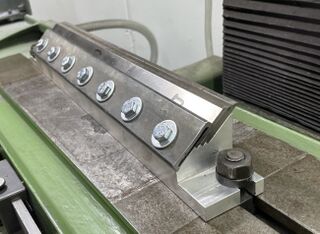Schaafmes Slijphouder: verschil tussen versies
(→Instructions / use) |
|||
| (4 tussenliggende versies door 2 gebruikers niet weergegeven) | |||
| Regel 1: | Regel 1: | ||
[[Categorie:Tool]][[Categorie:Metal]][[Categorie:Small]][[Categorie:Wood]]{{SafetyCat6}}{{NoiseCat3}} | [[Categorie:Tool]][[Categorie:Metal]][[Categorie:Small]][[Categorie:Wood]]{{SafetyCat6}}{{NoiseCat3}} | ||
| − | + | [[Categorie:Tools]][[Categorie:Metal working tools]][[Categorie:Wood working tools]] | |
Speciale houder om messen te slijpen op de [[Vlakslijpmachine / Surface Grinder]]. | Speciale houder om messen te slijpen op de [[Vlakslijpmachine / Surface Grinder]]. | ||
| Regel 11: | Regel 11: | ||
== Instructions / use == | == Instructions / use == | ||
| − | # You typically will have to remove the magnetchuck. You need Spanner #22 for this. Note that you do not have to unplug the magnetchuck - if no one is using the [[Abene | + | # You typically will have to remove the magnetchuck. You need Spanner #22 for this. Note that you do not have to unplug the magnetchuck - if no one is using the [[Abene Metal Mill / Freesbank]] - them placing it on that table is convenient. Make sure the cable does not snag. |
# Check that the surfaces are clean - so that the jig is mounted parallel to the table. Remove any cruft. | # Check that the surfaces are clean - so that the jig is mounted parallel to the table. Remove any cruft. | ||
# Mount jig on the [[Vlakslijpmachine / Surface Grinder|Surface Grinder]]; It will be diagonal. This is intentional. # Ensure the jig is clean (so the knifes will seat well/flush) | # Mount jig on the [[Vlakslijpmachine / Surface Grinder|Surface Grinder]]; It will be diagonal. This is intentional. # Ensure the jig is clean (so the knifes will seat well/flush) | ||
| Regel 22: | Regel 22: | ||
# Start motion & coolant. | # Start motion & coolant. | ||
# Now gently lower the wheel in small steps until it just touches (usually at the far left or right side; the middle is often a bit lower. | # Now gently lower the wheel in small steps until it just touches (usually at the far left or right side; the middle is often a bit lower. | ||
| − | # Make a full pass; then go down in steps of 5 to 10 until all nicks and scratches are gone. | + | # Make a full pass; then go down in steps of 5 to 10 until all nicks and scratches are gone. It pays trying to be economical; the less you take off - the longer we can postpone buying new knifes again (they have to come from Germany; a new set is a bit over a 100 euro's including shipping). |
| − | + | # Best to use fairly small steps in the Y direction; and towards the high end for the X travel. You will see blueing/discoloration or pretty patterns if you dwell too much or try to take too much off. Usually this starts on the far left/right first. In that case; increase the X travel speed; and decrease the steps down you are taking. And check that the coolant hits the work (and _not_ the stone). | |
| − | # Best to use fairly small steps in the Y direction; and towards the high end for the X travel. You will see blueing if you dwell too much or try to take too much off. | ||
# Step down (just) 2; and do a 2 final passes (or 3 if it it still touches somewhere) - i.e. letting it spark out. It may take a bit - as something seems quite heat/expansion sensitive. | # Step down (just) 2; and do a 2 final passes (or 3 if it it still touches somewhere) - i.e. letting it spark out. It may take a bit - as something seems quite heat/expansion sensitive. | ||
# Remove knifes & use the wetsteen(speksteen) to remove the burs on the back. | # Remove knifes & use the wetsteen(speksteen) to remove the burs on the back. | ||
# Check that the surface is clean and that there is no crust/cruft on the magnetchuck before putting it back. Light oiling recommended. | # Check that the surface is clean and that there is no crust/cruft on the magnetchuck before putting it back. Light oiling recommended. | ||
Huidige versie van 28 okt 2024 om 22:36
This equipment is safety category 6: Other equipment with no limits.
This equipment is Noise Category 3: Can be used at all hours. No limits.
Speciale houder om messen te slijpen op de Vlakslijpmachine / Surface Grinder.
Met dank aan HansD. Vraag demo bij HansD of Dirk-Willem. Het is absoluut niet moeilijk.
Movie: https://vimeo.com/manage/videos/663078557 or https://vimeo.com/manage/videos/663078557
Instructions / use
- You typically will have to remove the magnetchuck. You need Spanner #22 for this. Note that you do not have to unplug the magnetchuck - if no one is using the Abene Metal Mill / Freesbank - them placing it on that table is convenient. Make sure the cable does not snag.
- Check that the surfaces are clean - so that the jig is mounted parallel to the table. Remove any cruft.
- Mount jig on the Surface Grinder; It will be diagonal. This is intentional. # Ensure the jig is clean (so the knifes will seat well/flush)
- Ensure the knifes are clean (so the knifes will be tightly packet)
- Put the knifes in the jigs; hand tighten and then tighten the bolds gradually; in several stap. To avoid asymmetry/building up needless stress.
- Puth the endstoppers as far left/right as you can; but where they still easily 'lock' in place.
- Lower the wheel over the knifes until you can just about no longer have a piece of (thin) paper in between. Err on the side of 'too high'.
- Gently check that it also does not touch (at all) at the far left/right
- Start the wheel. Move table forward so that the wheel is just 'before' the knifes.
- Start motion & coolant.
- Now gently lower the wheel in small steps until it just touches (usually at the far left or right side; the middle is often a bit lower.
- Make a full pass; then go down in steps of 5 to 10 until all nicks and scratches are gone. It pays trying to be economical; the less you take off - the longer we can postpone buying new knifes again (they have to come from Germany; a new set is a bit over a 100 euro's including shipping).
- Best to use fairly small steps in the Y direction; and towards the high end for the X travel. You will see blueing/discoloration or pretty patterns if you dwell too much or try to take too much off. Usually this starts on the far left/right first. In that case; increase the X travel speed; and decrease the steps down you are taking. And check that the coolant hits the work (and _not_ the stone).
- Step down (just) 2; and do a 2 final passes (or 3 if it it still touches somewhere) - i.e. letting it spark out. It may take a bit - as something seems quite heat/expansion sensitive.
- Remove knifes & use the wetsteen(speksteen) to remove the burs on the back.
- Check that the surface is clean and that there is no crust/cruft on the magnetchuck before putting it back. Light oiling recommended.


